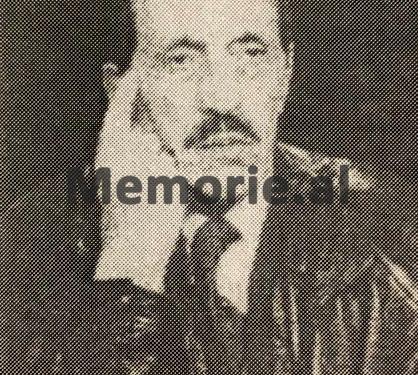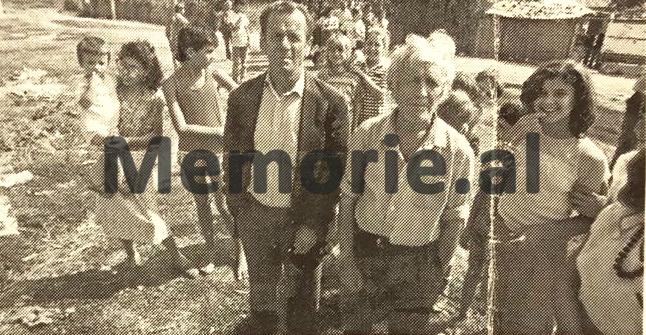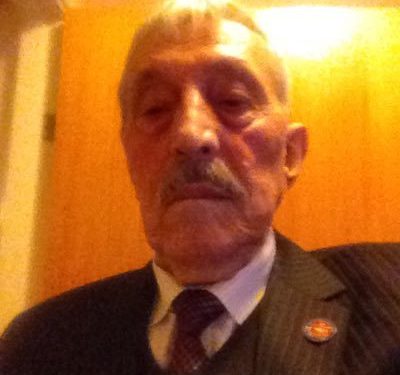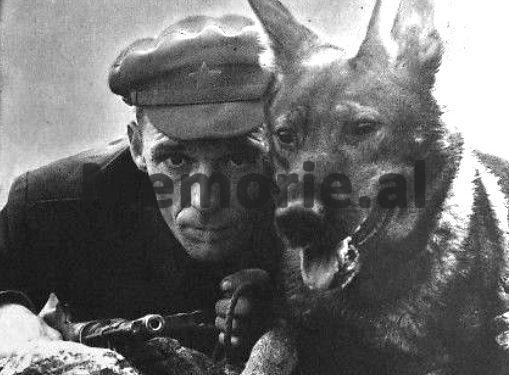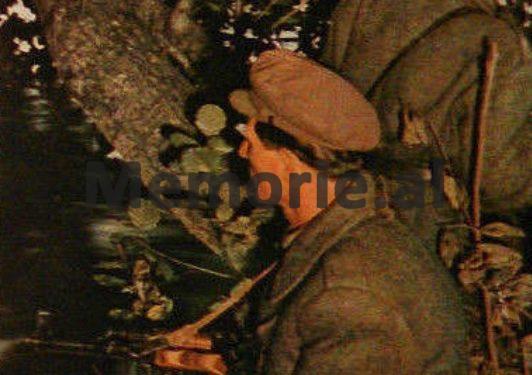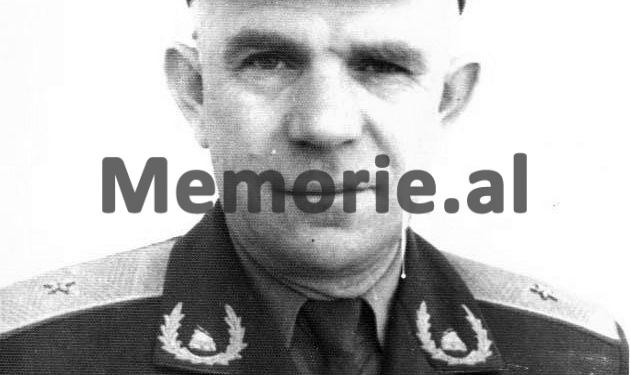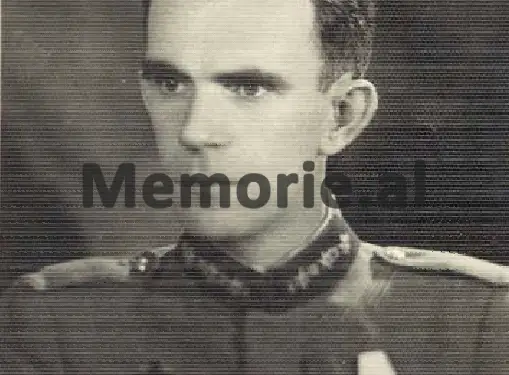Dashnor Kaloçi
Memorie.al publishes the unknown story of Nazmi Berisha, originally from the village of Llap in the municipality of Podujeva in Kosovo, who was seduced by the propaganda of the communist regime and the programs given by Radio Tirana for “socialist prosperity” and to escaping the rank-and-file methods of the Titoist regime, in 1960, he decided to flee and came to Albania, swimming in the Buna River in the great cold of that wild winter. Nazmi Berisha’s rare testimonies of how he was received in his native homeland, where soldiers and border officers of the Shkodra district, after connecting him by wire, sent him to the Internal Affairs Branch, where for 24 hours they did not even give him bread for eaten and then sent to the town of Shijak where the “Filter Center” of Kosovar immigrants was. The whole adventure of the 20-year-old boy from Kosovo that the State Security accused him of: he was an agent of the UDB, who had sent him on a secret mission, Cedo Topallovic, the chairman of the UDB for Kosovo, to meet with the Counter-Admiral of the Fighting Fleet, Teme Sejko and the inhuman tortures inflicted on him in the Internal Affairs Branches of Lushnja, Kruja, Tirana, etc., where he was kept in solitary confinement and asked to become a collaborator of the State Security, by brought out as witnesses, his compatriots from Kosovo, and his refusal, which caused him to spend a full 20 years in the prisons of the communist regime of Enver Hoxha.
“Once, through my situation as a somnambule, I asked for a meeting with Mehmet Shehu, arguing in front of them that he was brave and that the brave could neither forgive nor kill. At my request, I was not allowed to meet with the Prime Minister but was brought to me by a Security General named Nevazt Haznedari. As soon as he entered me, the general threw his arms around my neck and hugged me. I could not judge in those moments the real motives of his behavior, but I was confused by that. He was red-faced, shaved, handsome, and with a serious and healthy look, and the general’s clothes looked beautiful. He asked the officers about me and they told him I had not accepted anything. He immediately addressed me, saying: “How come you are not ashamed to deny the work you have done, do you remember that we do not know who sent you to Albania” ?! This is how Nazmi Berisha recalled, among other things, his meeting with the infamous General Nevza Haznedari, the former head of the Investigation, after the request he had made to meet with Prime Minister Mehmet Shehu, while he was in the dark cells of the State Security… Nazmiu, also known as Dyzi, who fled Yugoslavia to Albania in 1959, has been living for years as a political asylum seeker in Oslo, Norway, where he settled after his repatriation in 1980. his tragedy, how he spent 20 years in the prisons of the communist regime of Enver Hoxha, accused of being an agent of the UDB.
Dream to meet, “the legendary leader, Enver Hoxha”
Nazmiu was born in 1939 in the village of Llap in the municipality of Podujeva in the province of Kosovo. Like many other young Kosovars who at that time could not stand the oppression of the Titoist regime with Rankovi method methods, Nazmi Berisha, when he was not more than 21 years old, seduced by the propaganda of the Albanian communist regime, for “socialist prosperity”, decided to escape from Yugoslavia and come to Albania. In this regard, Nazmi recalled: “As I grew up, I was confronted with the cruel injustices that had their origins in our red and black flag, which they had taken away from us. At the Pristina train station, hundreds of Kosovars with heartache left their homeland to go to Turkey. That was a creepy farewell. Once upon a time, in our house, we had the joy that “Albania” would come there. It was a radio that our father had bought for us, and we could hardly wait to listen to Radio Tirana. It was the great parade of May 1, attended by hundreds of thousands of workers, peasants, students, pupils, and soldiers. Oh god, what a pride. I even heard Enver Hoxha, the called leader, the legend of Albania, speak. To be honest, that voice filled my heart. I had the idea that Albania beyond and Albania here would be together. And I would once embrace that man named Enver Hoxha, whose house was still trembling from his ringing voice. I believed that from that voice the dates of the Yugoslavs were passed. And how could that sound not give me hope, when in your land you encountered every day a bitter reality from the methods of UDB, such as violent expulsion, closure of schools, exile, espionage, etc. At that time, while listening to that radio and the voice of the popular singer Dervish Shaqja, with his songs about Kosovo, my eyes filled with tears. Physically I lived in Prishtina, but spiritually I was in Albania. Filled with this reality, at that time I did not know at all about the real hell where Albanians lived, and the bombastic words on the radio gave me confidence and gave me hope “, recalls Nazmi Berisha, the period when he was very young, faced two very real realities. opposites that prompted him to take the road towards the border to Albania.
Arriving in Albania by swimming from the river Buna
Regarding the plan and the vicissitudes of the escape from Kosovo to Albania, Nazmi Berisha recalls: “I decided to leave. The dilemma of finding the best routes bothered me a lot, as I was completely alone. I finally boarded the train to Rijeka and then a bus to Ulcinj. Even there was an Albania very close to the sea. I was tired and exhausted, but the hope that I would soon be in Albania, that black wall beyond Berlin, would keep me alive. So, I would see my Albania and kiss it on the forehead. After avoiding a suspicious villager and the first part of the night of her infidelity, crouching at the foot of a mountain, I, with the verdict of the hungry, jumped on Buna with a swim. As I swam, the lights of Ulcinj shone farther and farther away. The other bank of the Buna was very far away, and I continued to swim so nakedly that I could not breathe because of the cold. I could cross that river, only my dream was stronger than its cold wave. The first thought that came to my mind was to surrender to the police, but no human foot was visible. Finally, as I walked, I saw some cattle and light on. To my call: ‘O Albanians’, they responded with several gunshots and the call: hands up. As my heart pounded that I would finally see the soldiers and police officers of the homeland, two soldiers came out of the darkness and tied my hands behind my back with a belt. They put me in front of them and in their post I was confronted by an officer sitting in a simple chair. I justified their brutal behavior because I came from across the border, where the two countries were knife to knife. The officer’s first questions were: from the line, with whom I had been and why I was naked. As the officer looked at me in amazement and doubted my words, I said, “Brother, I have fled Yugoslavia, and everything I say is true.” I came to Albania myself, according to my deep conviction, that this is my homeland. I want to be educated here and become valuable to Albania. The officer continued with the same questions, and I asked him for bread and water. When I opened my eyes, I saw two soldiers at my head and I was overjoyed when they told me that they would take me to Shkodra, about which I had heard so many stories. The two soldiers took me to the Internal Affairs Branch, which I had never heard of. I realized it was similar to the Yugoslav militia. There they put me in a room where there was a big picture of Enver Hoxha, for which I had affection. I was very excited and the officer who noticed this allowed me to sit down. I tried to dispel the fear, thinking that these officers were not like those of the UDB, who beat and drugged my uncle, these were national pride. After signing, I was allowed to rest. One policeman picked me up and took me down the stairs, handing me over to another, who did the third check since I entered the border. He opened a heavy door and I found myself in the cell. There I was paralyzed and only woke up the next day. Nobody remembered me. I knocked hard on the door and asked for bread. The policeman replied: he did not meet me that day. It didn’t take long and the guard opened the dungeon door. The same police officers asked me those questions the day before, while I was starving. The next day, I was sent to Shijak and Shkodra, which I had dreamed of, I did not see at all. In Shijak I was placed in a house they called the Reception House. I was there as if I were at home, I was free and the food was provided by the police. On the second day, I was asked questions by the Shijak police, just like the ones in Shkodra. I tried not to forget anything without saying, with the thought that this was how I served my Albania more “recalled Nazmi Berisha, the first days of coming to the” dreamed land “.
Myzeqe internment camp in Çermë
In the town of Shijak, Nazmi Berisha stayed for about two months, where he occasionally turned himself into the police. Police officers also occasionally went to his room, interrogating him in detail. After two months, they removed him from there, to take him in a direction unknown to him. Regarding this, Nazmi recalled: “When I had not completed two months in Shijak, I was again taken to the streets. The discovered car left smoke behind. I watched the undressed and weak peasants working in the fields. Likewise, their poorly dressed children played and sang in Albanian. Once the car stopped. The place was called Çermë. We got out of the car with the long shadow of the policeman behind us. I was impressed by the fact that, unlike in Pristina, you only found short people there. Although there was nothing romantic about it, in my retina those people were happy. Once upon a time, there was the swamp of Tërbuf, where the horror of the musketeers tore malaria. Near Çermë, were the barracks of political prisoners. Those barracks were the last evidence of the work of those slaves (as I would later call them, that at that time I did not even dare) who had dried up the Tërbuf swamp. Shuaip Hoxhiqi told me about Çermë, Tërbufi, and the barracks. “Do you believe it, my friend?” He said to me in a half-hearted dialect, that prisoners eat each other’s vomit ?! Shuaipi was a Kosovar like me, and he was allegedly convicted as a UDB agent. I took his words with reservations, but he told me anyway. People were dying for bread, he told me. The concentration camps were, as in Hitler’s time, perhaps darker. Prisoners put them in a cage woven with barbed wire in the middle of the open sky and left them there in the rain and in the sun, without the slightest fault. I had heard in Yugoslavia about the treatment of prisoners and the beatings that the UDB did to you, but I did not happen to be told by anyone about this kind of torture. There in Çermë, which was nothing but a concentration camp, although, without barbed wire, there were over 300 Kosovars. Their first words were: ‘What did you want to come here for? We all repent, if we find the opportunity, we will return on foot ?! That’s what Sokol Jaka, Adem Gega, and Hazir Haziri from Drenica told me. Most of them had been in Çermë for over five years. My dream of school was wasted there because there was no school in Çermë at all. Life there was so bleak that there was no light at all in our lives. They would wake us up at five in the morning and then line us up and count the people, then the bread and leave for work. There in the camp, which left nothing to the Nazis, each received a monthly salary of 200 lek (new). To get to Lushnja, you had to get permission from the police. There, as chief of police, was a certain Veli Kondi, who staged the escape attempts himself. He had become a perfect director, to put macabre performances on the stage of Çermë. One of my consolations at the time was the arrival of a thirty-year-old boy named Kapllan Resuli in Çermë. He was well known in Kosovo at that time, as a well-known writer. I invited him to come to my barracks and it was fortunate that I lived so long with that great patriot and writer. I filled the gloomy days and nights of Çermë with Kapllani, who told me about Idrozova’s prison in Yugoslavia, where he had been sentenced “, Nazmi Berisha recalled, for the period he was sent to the Çermë camp and the horrors he heard. by his Kosovar compatriots for that country.
How I was tortured in Tirana Prison
Two years after going to the Çermë camp, the State Security began to make the first attempts to recruit Nazmi Berisha as his agent. Regarding this, Nazmiu recalled: “One day, when I was returning from work, I was informed to go to the police in Lushnja. I thought they were asking me to take a picture at the Independence Monument in Vlora and another one where I was barefoot in Çermë and I sent these to my people in Prishtina. When I showed up at the Branch, the person waiting for me had come from the Ministry of the Interior. After asking me about the reasons for my coming to Albania, he addressed me, saying that: for people like me, the homeland needed me. At first, I was glad that for the first time since coming to Albania, I was hearing those words. He then told me to go to Çermë, because with patriots like me, there was never any trouble. As soon as I returned to Çermë, I expressed my joy to Kapllan Resuli. The next morning I was told I had to go back to Lushnja. This time in the Branch, I was received by a young officer named Hajri, who, after pointing out the Party’s trust in me, spoke at length about the Titoists’ intentions towards Albania and their vigilance. As a patriot and a man of faith, something was required of me: ‘I had to inform the general about what was happening in the camp because there were Yugoslav agents among us.’ Ahead of me was a statement, which read my nickname “Beautiful Mountain” and my obligations to notify Security for everything “, Nazmi Berisha recalled.
Signing the statement
At the Lushnja Internal Affairs Branch, the State Security, through fraud and taking advantage of the young age and naivety of 23-year-old Nazmi Berisha, persuaded him to sign the statement that he should cooperate with them. Regarding this, Nazmi recalled: “I signed the statement as stunned, but at that very moment something tightened around my throat….! Why did this have to happen that day and why with me? So I would denounce the friends I ate and drank with. While I was convinced that no one in the camp was a UDB envoy. I returned to Çermë extremely worried. I spy on friends ?! Never ever. Great job on why I signed that statement. I decided and told this to Kapllan Resuli’s friends. They told me to give up the insecurities of the Security and if they called me to the police, I would not go. I will not forget my friends, who saved me from the moral catastrophe, where the Security wanted to introduce me. It was not long before I was called to the police station. I calmly presented my judgment to him, telling him that: I did not know anything about what my friends were doing, that I was a prisoner, and that I was left alone after work when I went to the barracks. After a month, I was called back to the Lushnja branch. I met Sali Shatri and Remzi Berber at the police station. I met Sali in Shijak, and I saw Remzi for the first time. Sali Shatri was from Istog, Peja, and when I was in Shijak, he wished me good health and luck in Albania. To my surprise, the Security Service interrogated me, which I had been told earlier. Wildness was felt on their faces. I hadn’t even noticed that: the man who was asking me was Sali Shatri. Spallets were yellowed like autumn leaves. After a while, I was told I would go with them. I was amazed without knowing where they would take me “, recalled Nazmi Berisha, at a time when the Security was making every effort to recruit him as his agent.
In the Internal Branch of Kruja
Regarding the transfer from Lushnja to Kruja, Nazmiu recalled: “There were three policemen and a police car in the inner courtyard of the Lushnja Branch. Sali Shatri was a security officer from Peja and Remzi Berberi, also a security officer from Dibra e Madhe. Saliu was removed as if he were my man, and as far away as he was, he just smiled at me. I will never forget those faces. After a short trip, we found ourselves in the Kruja Branch. The “Reception House” in Kruja was better than the Shijak house. It was built on a sacred site for the Bektashis called Sarisalltik. The next day, as I had thought, they started a new round of questions. Sali Shatri and Remzi Berberi started asking me about everything, from family, friends, uncles, friends, what was being said about Enver Hoxha, socialism, about Tito, the names of UDB members, Kosovo professors, etc. My detailed proceedings continued for a month. Sali Shatri was no longer that of Lushnja, now he was slapping me on the shoulder, thanking me and treating me well. They once gave me some letters to sign, telling me they were the ones we had talked about. I not only signed them but also thanked them for the care they had shown me. Meanwhile, I rejoiced in myself, thinking that I would already be given permission to continue school. But the next day, before it was clear, I was approached by two Security Officers, whom I did not know at all. They said to me: ‘You are not an agent of Yugoslavia yet’ ?! I was horrified, and it seemed to me that they had slapped me in the face, and I replied: Am I an agent? ‘Yeah, you, and don’t pretend you don’t know anything. UDB President for Kosovo Cedo Topallovic sent you. We know this very well, ‘they told me. My forehead was filled with sweat and I addressed them, saying: they were provocative because I was completely honest. They told me: ‘Aren’t you a boy who signed yesterday’s statement with Remzi Berberi, where did you admit that you are a spy ?! I did not accept that and asked for a confrontation with Remzi and Sali Shatri. They brought me Ajet Haxhiu from Mitrovica, Kosovo, along with Sali Shatri. I told them that I had signed that statement in good faith with the Security Council, without knowing what was written there. And when they had heard me, they said unto me, Son, thou shalt show me the things that are. Who recruited you for espionage work against Albania, who escorted you to the border and what tasks were given to you, and with whom you will meet. Sit down and write it all down nicely, because we don’t have much time to wait. ‘ I didn’t want to believe my eyes or my ears. As many nonsenses flashed through my mind, I decided to write a letter to Mehmet Shehu, about whom I had heard endless legends in Kosovo. So I asked for a meeting with him. Let him be acquainted with the monstrosities at the expense of Kosovars. The next day, Mehmet Shehu sent me a general, who, without saying a word, showed me the newspaper “Zeri i Popullit”, where it was written about the Yugoslav revisionists who had two faces, just as I was a spy, who one day I accepted. and one day I denied that. I saw my serious condition, that according to that newspaper, my arrival in Albania was related to the group of Teme Sejko “, Nazmi Berisha recalled the attempts of the State Security to implicate him as an agent of UDB,” who was sent for to get in touch with Teme Sejko’s group ”!
Torture in Tirana prison
In the meeting with the General of the Ministry of Interior, Nazmi Berisha denied all the accusations made against him as a UDB agent. Regarding this, he recalled: “My words to the general were not taken into account. As he fled, I sat down and wept silently. After three days, Sali Shatri came with three officers and in a police car, they sent me to Tirana Prison. I was re-investigated there. I was asked to contact Teme Sejko’s group. Nazif Shehu and Nazmi Kraja from Shkodra carried out the investigations, both with the rank of captain. From the beginning, they asked me to sign the decision of the General Prosecutor, Aranit Çela, who charged me with the crimes I had not committed. I was never ashamed again. And I thought of those who would see my stupidity, my parents, my family, and all of Kosovo. And who would forgive me for that? Already with my firm, I could not satisfy the appetite of others. I had made many mistakes once. There in that prison, I spent days and nights exhausted and investigating. My only word was that Remzi Berberi had deceived me in Kruja. But their insistence was appalling, they especially wanted the statement. One day an investigation chief, Rexho Hyseni, came to me and was from Konispoli. He said: ‘Yes, we have an experience like this, we know the tricks of Tito’s spies well. Not everyone like you accepted it at first but then lectured like whistles. ‘ After that, I was tortured. They tied me up behind a lounged chair in concrete and dropped me with the palm of my hand on my throat. When they got tired, they called others to continue their work. They left me without trial for whole nights. They left me without bread and water and sent me to the bathroom, where it was very cold from the cement. I was sent to a dungeon where I could not move at all, because the guard came and beat me with an allaturka technique, and sent me back to the cement bath, where I was tied to the German irons. The torture lasted about seven or eight days. After that, they sent me to a dungeon, where they left me for a week without anyone asking me. Once, through my situation as a somnambule, I requested a meeting with Mehmet Shehu, arguing that he is brave and brave like him, neither to forgive nor to kill. They did not meet with the Prime Minister but brought me another general named Nevzat Haznedari. As soon as he entered me, he hugged me and hugged me. I could not judge at that moment, for his action, but I was confused by that thing. He asked the officers about me and they told him I had not accepted anything. Haznedari immediately addressed me: ‘How come you are not ashamed, that you deny the deed you did, do you remember that we do not know who sent you to Albania ?! After that, he ordered them to confront me. Investigators, enraged, used their entire arsenal. At first, they presented me with a letter from my sister-in-law, who ordered me to meet in Durrës with “Shkambin”, which was the node that would meet me with Teme Sejkon. This “Shkambi” had radio receivers associated with the Sixth American Fleet, with Greek monarch-fascists and Yugoslav revisionists. I insisted that they were just nonsense and nothing else “, recalled Nazmi Berisha, his tortures and vicissitudes in Tirana prison, where you want to implicate him as an agent, who had come to Albania with espionage missions sent by UDB.
False witnesses
After many years of investigation, the State Security decided to present witnesses against Nazmi, in order to break him. But who were those witnesses and what were they accusing Nazmi of? Regarding this, he recalled: “I knocked hard on the door and told the policeman that I only wanted to meet Mehmet Shehu. The Deputy Minister of Internal Affairs, Rexhep Kolli, received me as an investigator. He told me not to obstruct the investigating authorities and ordered Rexho Hyseni to confront me with the witnesses. It wasn’t long before Ali Zuka, a 60-year-old man from Pristina, whom I had known in Çermë, was put in my room. He testified that he had known me for a long time and that I had been sent to Albania by the UDB, whose spy I had been for a long time. Aliu also said that before he left for Albania, Cedo Topallovic, the chairman of the UDB for Kosovo, had instructed him to meet in Albania with the UDB agent, Nazmi Berisha, and Aziz Zhilivoda and Selam Tetova. , both Yugoslav spies. Ali Zhuka said this and I denied that he had been a friend of my father and that I only knew him from Çerma. Later, I learned that Zhilivoda and Tetova were imprisoned, as Aziz Zhilivoda went and came to Kadri Hazbiu, without knowing what the State Security plot was about. Then, the witness Selim Xhakaj, whom I knew completely, introduced me. He stated that: on behalf of UDB, he had kept in touch with me since Semani. From the vileness of my compatriots, I became so mad that they sent me to Dr. Ylvi Vehbiu, who told me that: with what I was doing, I was burdening myself and my family “, recalled Nazmiu, his compatriots, who were forced by the State Security to appear as witnesses, with fabricated accusations.
Repatriation in 1980
After all these vicissitudes, although Nazmi Berisha did not accept any of the accusations, he was sentenced to 25 years in political prison, from which he suffered 20 years in the prisons of the communist regime, accused of being a UDB agent. He was released on June 3, 1980, and sought repatriation to his native Kosovo. That was completed, and on October 8, 1980, a Security Officer with a “Volga” escorted Nazmi to the Morini border crossing. For that moment, in his memoirs, Nazmiu states: “I had overcome Golgotha”./Memorie.al




